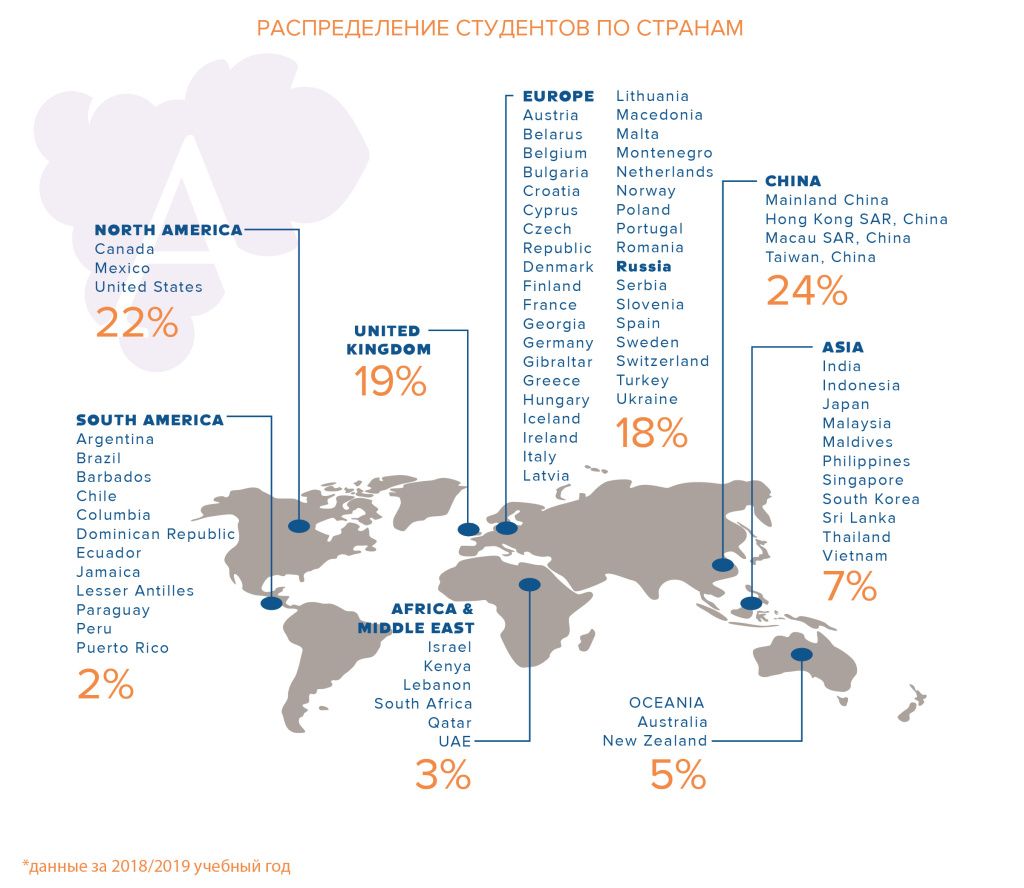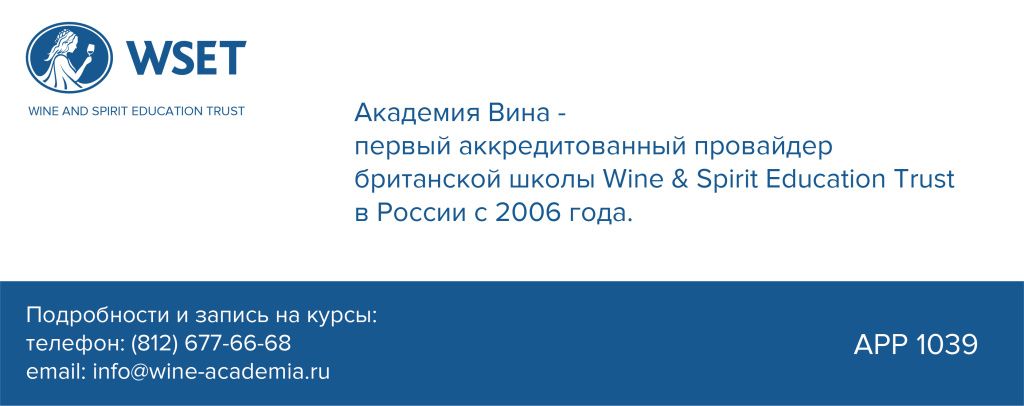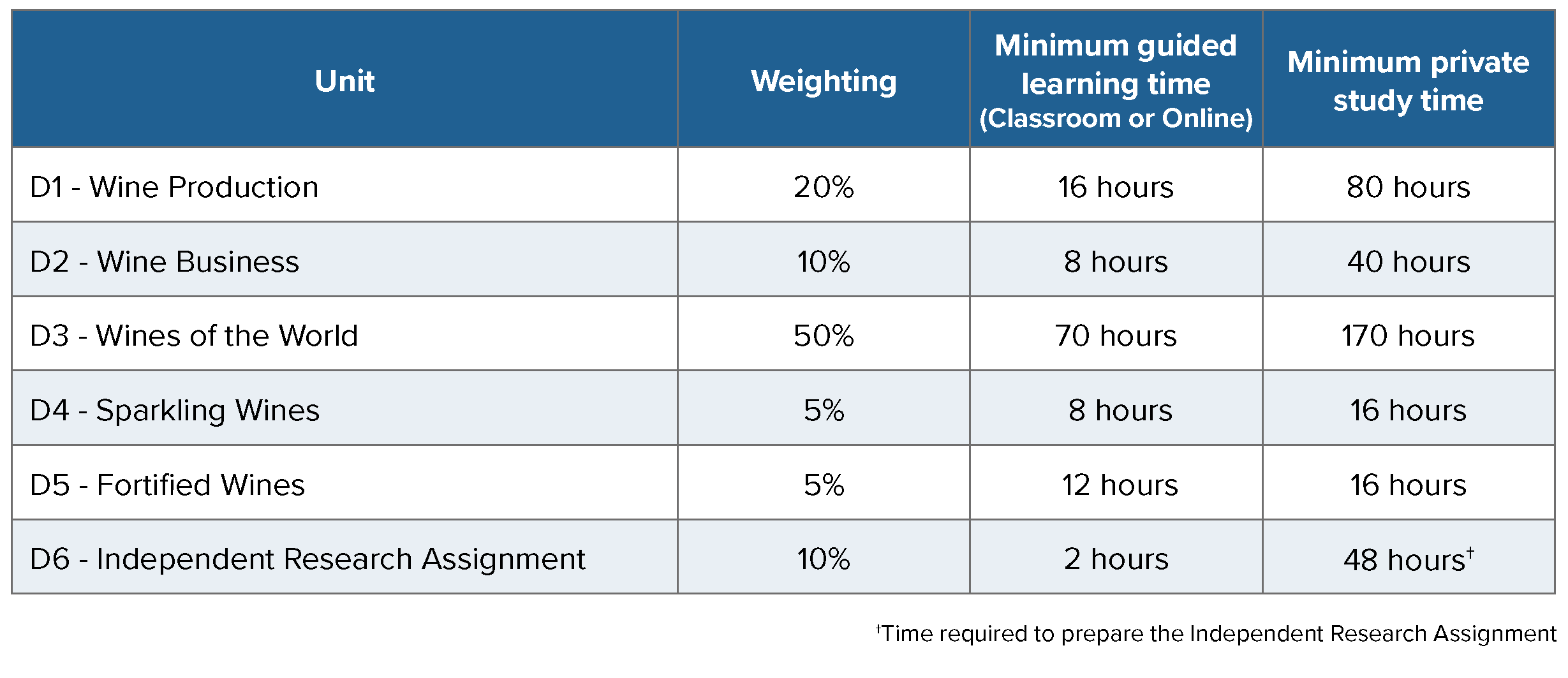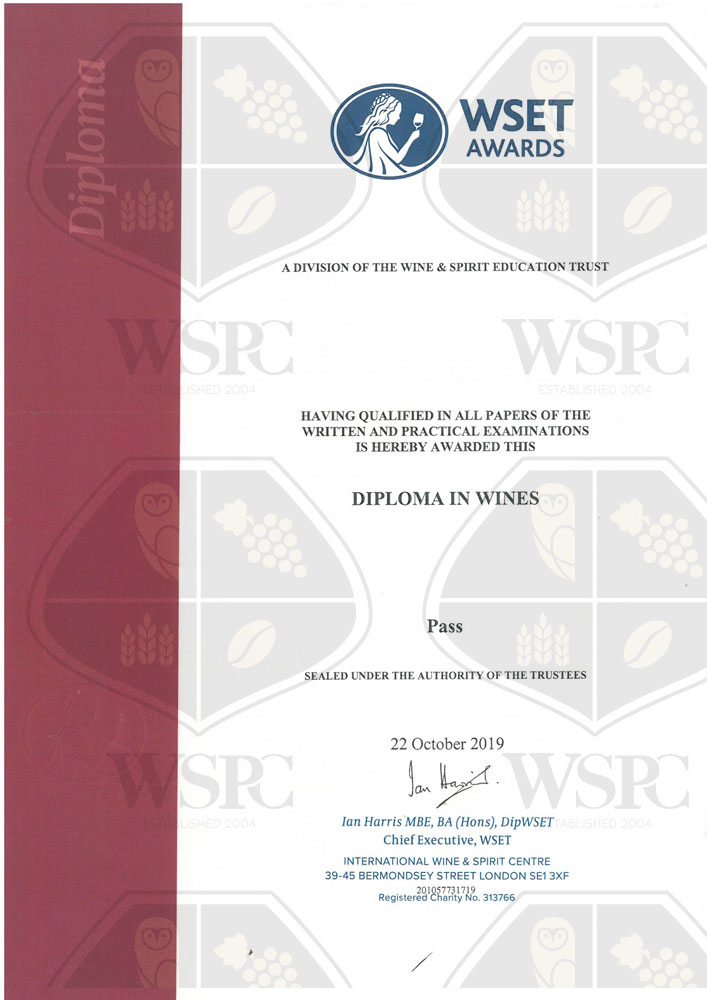
The WSET Level 4 Diploma in Wines is an expert-level qualification covering all aspects of wine.
Building on the knowledge and skills gained from the WSET Level 3 Award in Wines, the Diploma deepens your understanding of how and why wine production and business factors influence the style, quality, and price of wines. Your expertise is built both theoretically, through comprehensive study of a large number of wine regions, and practically, by developing your wine tasting skills to an expert level.
Successful graduates acquire exceptional analytical skills and proficiency in evaluative wine tasting, gaining global recognition as authoritative wine specialists. Should you wish to progress to the Master of Wine programme, you will be well-prepared.
WSET Diploma helped take my career in the industry to a new level. It empowered me to discuss wine with confidence and lead others through their own journey in wine. This course is the benchmark for anyone who is looking to be a professional in wine.
Emilie Steckenborn, Head of Education – ASIA, Treasury Wine Estates
What you’ll learn
The Diploma is delivered in six mandatory units covering a broad range of topics including wine production, wine business, and still, sparkling and fortified wines of the world.
D1 – Wine production
- Vine requirements
- Anatomy of the vine and grape
- Grape growing options, explaining and evaluating the different approaches and how these options affect grape yields, quality and the final wine produced
- Natural factors in the vineyard and how they influence the vine’s ability to produce grapes for wines of different styles, quality levels and price
- Winemaking and post-fermentation options and how they influence the style, quality and price of wines
D1 – hours of study weighting 20%
D2 – Wine business
- The types of businesses engaged in wine production and the options for getting wine to the point of sale
- Factors that contribute to the price of wine
- Key considerations in wine marketing
D2 – hours of study weighting 10%
D3 – Wines of the world | D4 – Sparkling wines | D5 – Fortified wines
In each of these Units you will learn:
- How grape-growing, winemaking, maturation, wine law and wine business influence the style, quality and price of the principal still wines (D3), sparkling wines (D4) and fortified wines (D5) of the world.
- How to taste and evaluate still wines (D3), sparkling wines (D4) and fortified wines (D5) using the WSET Level 4 Systematic Approach to Tasting Wine®(SAT)
D3 – Wines of the world: hours of study weighting 50%
D4 – Sparkling wines: hours of study weighting 5%
D5 – Fortified wines: hours of study weighting 5%
D6 – Independent research assignment
- How to research a specified wine-related subject
D6 – hours of study weighting 10%
Course delivery
This qualification has a minimum requirement of 500 hours* of study time:
- 116 hours of delivery time with a WSET course provider (classroom or online)
- 370 hours of personal study and revision, including preparing an independent research assignment (D6)
- Examinations for each unit (excluding D6) totalling 11 hours 50 minutes.
It normally takes between 18 months and 3 years to complete the Diploma. Each unit is weighted differently in terms of hours of study required, the table below shows the minimum guided learning time, private study time and the weighting applied against each unit.
*Delivery will vary by course provider; however, this is the minimum requirement that should be met.
Assessment
To complete the Diploma you must pass all six units, successfully meeting the rigorous assessment requirements across the syllabus. Assessment varies by Unit:
D1 – Wine production
1½ hour closed-book examination made up of open-response questions
D2 – Wine business
1 hour closed-book examination made up of open-response questions
D3 – Wines of the world
A theory and tasting examination to be held over two consecutive days:
- Day one – A two-part theory exam formed of open-response questions to be completed in 3 hours 20 minutes (one 2-hour paper and one 80-minute paper).
- Day two – A two-part blind tasting examination of 12 wines to be completed in 3 hours (two papers of 1½ hours)
D4 – Sparkling wines
1½ hour closed-book examination made up of open-response questions and a blind tasting of three sparkling wines
D5 – Fortified wines
1½ hour closed-book examination made up of open-response questions and a blind tasting of three fortified wines
D6 – Independent research assignment
One research assignment of 3,000 words
Those who successfully complete the Diploma will receive a WSET certificate and lapel pin and will be able to use the post-nominal “DipWSET” and associated WSET certified logo. You will also become a member of our Alumni Body, with access to our quarterly reports and a number of exclusive events.
Entry requirements
Candidates must hold either the WSET Level 3 Award in Wines or the WSET Level 3 Award in Wines and Spirits to enrol on the WSET Level 4 Diploma and must be of legal drinking age in the country where you are attending the course and exam to participate in any alcohol tasting. Requirements may vary by course provider.
Candidates whose first language is not English are strongly recommended to have an IELTS score of 6.5 or above or be able to demonstrate an equivalent ability level.
}
Welcome to our guide to the Wine & Spirit Education Trust (WSET) Diploma. This represents the WSET Level 4 in Wines is the pinnacle of wine qualifications available from the Wine & Spirit Education Trust. Whether you are looking to advance your wine career or are simply a dedicated wine enthusiasts, the WSET diploma is definitely worth considering. In this guide we’ll help you to navigate the details of the qualification and decide if it is the right one for you.
The WSET Diploma is extensive and will cover many different components of the wine industry. Like levels 1-3 there is a an emphasis on the wines of the world, but the diploma also has dedicated components covering other aspects of the wine industry. It then concludes with an independent research assignment.
WSET Diploma – Level 4 in Wine – Syllabus
The WSET Diploma in split into 6 components. The first two (wine production and wine business) must be studied first and they provide a foundation which will then be built upon in subsequent modules. After you have completed these two components, it is then possible to study the other 4 modules in any order.
Wine Production
Wine production is split into 3 components:
Vine requirements and Growing Environment Influences
This learning outcome starts by taking you through the anatomy of the vine. You’ll look at the components of the vine itself, its needs and the various stages of the growth cycle. You’ll then analyse the growing environment, covering the factors that influence the key growth requirements and take a look at some of the challenges faced such as hazards, diseases and climate change. Finally, the learning outcome will finish with an analysis of how certain factors affect the ability of the vine to produce and ripen grapes.
Grape Growing Options
This learning outcome guides you through the various options available to us in the vineyard and how our choices will affect the styles and quality of the final wine produced. You’ll start by analyzing different approaches including the topical options of sustainability, organic and bio-dynamic winemaking. You will also take a look at considerations for establishing vineyard sites as well as options for vineyard management and the production and ripening of grapes.
Winemaking Options
The final learning outcome in the WSET Diploma module 1 looks at the winemaking options available to winemakers. This will include items such as:
- Approaches to winemaking
- Options in the winemaking process including grape processing, clarification, malolactic fermentation, maturation, stabilization and closures.
- Wine faults and quality control processes
Wine Business
Wine business is the second module in the WSET Diploma in wine. It has 3 components:
Factors Influencing Wine Price
In this module you’ll cover the factors influencing the price of wine, including:
- Supply and demand
- Costs of getting the wine to market
- Legislation considerations
- Exchange rates and how they affect cross border sales
Wine Businesses and Distribution Channels
From growers, to merchants to co-operatives there are a range of businesses involved at various stages of wine production. You’ll look at the key players and how they fit together. The learning outcome concludes with an analysis of the different options of getting a wine to market.
Wine Marketing
Wine marketing starts by taking a look at the product to be marketed and how it should fit in with the current marketplace. It then looks at how to target consumers, including marketing strategy, and finished by taking a look at the marketing mix.
Wines of the World
Wines of the world is split into two learning outcomes:
How various factors influence the style, quality and price of the principal world wines
This module starts with a look at the styles of wine that are produced in the principal wine regions of the world. This will include the growing environments, production methods, regulation and points of difference affect the wines produced. This knowledge then forms a basis for the second learning outcome where you will taste and evaluate wines from these regions.
Tasting and evaluation of wines from principle wine regions
This is the first tasting component of the WSET Diploma in Wines. It involves tasting and evaluating wines from the principal wines regions covered in the previous learning outcome. The analysis and tasting exam will be based on the WSET Level 4 Systematic Approach to Tasting Wine.
Sparkling Wines
The sparkling wines module of the WSET Diploma follows a similar structure to that of the still wines. It is split into the following 2 learning outcomes:
How various factors influence the style, quality and price of the principal sparkling wines
This module starts with a look at the sparkling wines that are produced around the world. This will include the growing environments, production methods, regulation and points of difference affect the wines produced. This knowledge then forms a basis for the second learning outcome where you will taste and evaluate the sparkling wines from these regions.
Tasting and evaluation of sparkling wines
This is a further tasting component of the WSET Diploma in Wines. It involves tasting and evaluating sparkling wines covered in the previous learning outcome. The analysis and tasting exam will be based on the WSET Level 4 Systematic Approach to Tasting Wine.
Fortified Wines
Similar to the still and sparkling wine modules, the fortified wine module is split into two components:
How various factors influence the style, quality and price of the fortified wines
This module starts with a look at the fortified wines that are produced around the world. This will include the growing environments, production methods, regulation and points of difference affect the wines produced. This knowledge then forms a basis for the second learning outcome where you will taste and evaluate the fortified wines from these regions.
Tasting and evaluation of fortified wines
This is a further tasting component of the WSET Diploma in Wines. It involves tasting and evaluating fortified wines covered in the previous learning outcome. The analysis and tasting exam will be based on the WSET Level 4 Systematic Approach to Tasting Wine.
Independent Research Assignment
The research component of the WSET Diploma in Wines involved the research of a wine related subject. The final outcome is a 3,000 word paper that should:
- Demonstrate knowledge and understanding of the subject
- Evaluate source material
- Construct arguments
- Reach an informed conclusion
WSET Diploma – Teaching
You’ll need to register for the course with an approved WSET course provider. The length of time to finish the course will depend on the schedule of the course provider as well as whether the candidate passes all module at the first attempt. It usually takes between 18 month and 3 years to pass the diploma. There is a minimum learning time (in the classroom or online) of 116 hours along with a recommended 370 hours of private study. Taking examination time into account this brings the total time commitment to 500 hours.
WSET Diploma – Examination
The WSET Diploma is marks on a modular basis in the following way:
Wine Production
- Weighting: 20%
- 1.5 hour written exam
Wine Business
- Weighting: 10%
- 1 hour written exam
Still Wines
- Weighting: 50%
- Day 1:
- 2 hour written exam
- 1 hour 20 minute written exam
- Day 2:
- 1.5 hour blind tasting of 6 wines
- 1.5 hour blind tasting of 6 wines
Sparkling Wines
- Weighting: 5%
- 1.5 hours written exam including blind tasting of 3 wines
Fortified Wines
- Weighting: 5%
- 1.5 hours written exam including blind tasting of 3 wines
Research Paper
- Weighting: 10%
- 1 research assignment of 3,000 words
Prerequisites for Entry
For entry into the WSET Diploma in Wines students must have passed either the WSET Level 3 in Wines or the WSET Level 3 Award in Wines and Spirits.
WSET Diploma – Level 4 in Wine – Conclusion
The WSET Diploma is the pinnacle of wine qualifications offered by the Wine & Spirits Education Trust. It will provide you with a rounded and comprehensive knowledge of the wine industry and set you up for a prosperous career in wine. The WSET Diploma is also a recommended launching pad for those wishing to continue on to the Master of Wine qualification.
Good luck!
WSET — это учебная организация, которая была основана в Лондоне в 1969 году и имела своей целью разработку и внедрение четких единых стандартов, которые можно было бы применять для объективной оценки квалификации специалистов, работающих в винном бизнесе (в первую очередь, сотрудников виноторговых компаний и специализированных розничных магазинов)
Wset «wine & spirit education trust» (ВСЕТ) (образовательный фонд «вина и крепкие спиртные напитки») обладает более чем 40-летним опытом в сфере разработки и предоставления образовательных программ и присвоения квалификаций в области знаний о винах и крепких алкогольных напитках.
Разумеется, одна школа не могла обеспечить обучение такого потока учащихся, который был бы необходим для по-настоящему широкого распространения стандартов WSET. Поэтому была создана система аккредитованных преподавателей WSET и школ-провайдеров, которые, при условии соответствия строгим стандартам центральной Лондонской школы и прохождения процедур аккредитации, получали право проведения курсов по квалификациям WSET вне Лондона (и, впоследствии, вне Великобритании и Европы вообще).
- ПРЕИМУЩЕСТВА ШКОЛЫ WSET
1. Отличная структурированность излагаемой информации, значительно упрощающая усвоение знаний.
2. Тщательно продуманная и отработанная методика изложения материала.
3. Выраженный акцент на практических знаниях, получении студентами обширного дегустационного опыта и практики по сочетанию вина и блюд.
4. Актуальность знаний, благодаря ежегодному обновлению преподавательских программ и учебных материалов в соответствии с изменениями на алкогольном рынке.
5. Международное признание квалификаций WSET.
6. Доступ к обширной базе данных справочных материалов WSET в течение неограниченного времени после прохождения курса.
7. Востребованность знаний и навыков, приобретаемых в ходе обучения на курсах WSET для выполнения широкого круга обязанностей в компаниях, работающих на алкогольном рынке
- КВАЛИФИКАЦИИ WSET
Правительство Великобритании учредило регулирующий орган — Управление регламентирования квалификациЙ и экзаменов (Office of the Qualifications and Examinations Regulator — OfQual), который регулирует организации, присваивающие квалификации в рамках Системы Qualifications and Credit Framework — QCF. Некоторые квалификации WSET включены в QCF, как указанно ниже:
•Первая ступень — WSET 1 Foundation — самая простая и краткая: обучение по ней идет всего 1 день, это, по сути, самый базовый обзор вина как продукта, объясняющий новичкам, что такое вино, и как его делают, как правильно дегустировать вино, как оценивать его качество, какие бывают типы и стили вин, каковы основные правила сочетания вина с едой и так далее.
•Вторая ступень — WSET 2 Intermediate — это курс из шести модулей (обучение, например, в режиме интенсива длится три рабочих дня), с уже более широким кругом рассматриваемых вопросов и более серьезной их детализацией. Рассматриваются основные винные страны и регионы, международные и местные сорта винограда, используемые для производства вина, практическая программа дегустации включает в себя порядка 50-ти образцов вин и крепких алкогольных напитков. Второй уровень подходит как для тех людей, которые пришли на курс «с нуля» и хотят получить качественную базу самых необходимых знаний, так и для тех специалистов, которые уже работают с алкоголем, но хотят систематизировать свой теоретический «багаж» и улучшить навыки дегустации.
•Третья ступень — WSET 3 Advanced — уже подразумевает уровень знаний, достаточный для работы в среднем/высшем звене структуры виноторговых компаний или розничных точек продаж. В интенсивном режиме обучение длится пять рабочих дней. В ходе курса подробно рассматриваются сорта винограда, винодельческие страны и регионы мира, особенности производства, типы и стили вин, правила подбора удачных винно-гастрономических сочетаний и так далее. Дегустационная программа третьей ступени состоит 50+ образцов; экзамен в конце курса включает в себя открытые вопросы и слепую дегустацию двух образцов вин и/или крепких алкогольных напитков.
•Четвертая ступень — WSET Diploma — это программа, состоящая из нескольких модулей, прохождение которых в общей сложности занимает у кандидатов как правило около двух лет. Обучение включает в себя как очные сессии, так и самостоятельные практические исследования по темам модулей. В винном мире WSET Diploma неофициально считается подготовкой к получению самой престижной профессиональной степени Master of Wine.
Более подробно об учебных программах по каждой квалификации Вы можете ознакомиться на индивидуальных страницах курсов WSET Level 2 Award in Wines, WSET Level 3 Award in Wines.
С 2018/19 года доступны восемь квалификаций WSET, разных направленностей (вино, крепкие спиртные напитки, саке), начиная от однодневных курсов для начинающих и заканчивая дипломом специалиста:
1. WSET Level 1 Award in Wines
2. WSET Level 2 Award in Wines
3. WSET Level 3 Award in Wines
4. WSET Level 4 Diploma in Wines and Spirits
5. WSET Level 1 Award in Spirits
6. WSET Level 2 Award in Spirits
7. WSET Level 1 Award in Sake
8. WSET Level 3 Award in Sake
- ГЛОБАЛЬНАЯ СЕТЬ WSET
WSET работает с сетью из более чем 800 официальных провайдеров, известных как APP (Одобренный провайдер) в 72 странах.
На сегодняшний день, школы-провайдеры существуют более чем в семидесяти странах мира, программы WSET официально переведены на 15 языков, и уже можно уверенно говорить о признании WSET ведущим мировым образовательным проектом в алкогольной сфере. При этом важно отметить тот момент, что лицензии аккредитованных провайдеров обновляются ежегодно, экзаменационные бланки присылаются напрямую из Лондонского офиса, и проверка экзаменационных работ производится там же — то есть, центральная школа WSET по-прежнему оставляет право контроля стандартов обучения и выставления оценок исключительно за собой.

- WSET (ВСЕТ) В РОССИИ
Аккредитованной школой-провайдером WSET® на территории России является «Академия Вина«. В рамках своей Международной программы Академия Вина сотрудничает с Центрами Преподавания Программ по всему миру, и по возможности создает условия для того, чтобы квалификации WSET были доступными и на других языках, кроме английского.

- ОТДЕЛ «WSET AWARDS» (ОТДЕЛ ПРИСУЖДЕНИЯ КВАЛИФИКАЦИЙ WSET)
Отдел «WSET Awards» (Отдел присуждения квалификаций WSET) — это подразделение «Wine & Spirit Education Trust» (Образовательный фонд «Вина и крепкие спиртные напитки»), отвечающее за создание, обработку и обеспечение качества оценки уровня знаний, ведущих к квалификациям WSET.
Это достигается за счет:
• постоянного контакта с индустрией напитков, что позволяет составлять надлежащие спецификации,
• назначения аккредитованных провайдеров программ для преподавания,
• проведения экзаменов,
• выдачи сертификатов кандидатам, успешно сдавшим экзамены.
WSET® Awards несет полную и единоличную ответственность за развитие и присуждение аккредитованных уровней спецификаций WSET® и является Органом присуждения квалификаций «Wine & Spirit Education Trust».
Отдел «WSET Awards» соответствует действующей Quality Management System (Система Контроля Качества) и удовлетворяет условиям BS EN ISO 9001 в области присуждения квалификаций и проведения экзаменов на знание предмета и компетенции в области дегустаций алкогольных напитков.
Подробнее о курсе WSET Level 2 Award in Wines >>
Подробнее о курсе WSET Level 3 Award in Wines >>
Сайт WSET: wsetglobal.com
27.07.2022
The WSET Level 4 Diploma is the highest qualification offered by the Wine & Spirit Education Trust. Holders of WSET Level 4 Diploma are recognized around the world as specialist professionals with exceptional knowledge of all aspetcts of the wine industry and deep analytical skills enabling them to operate successfully in the highest ranks of any wine-related business.
Only 10,000 people worldwide have ever gained this prestigious qualification, which is also the ideal stepping stone for anyone with the ambition to enter the Master of Wine programme.
An absolute minimum of 500 hours of preparation, between tutored classes and private study time is required to achieve the knowledge and analytical skills required to achieve the WSET Level 4 Diploma.
At AccademiaVino we are currently working to offer the WSET Level 4 Diploma in Italy.
Entry requirements
Before joining a WSET Level 4 Diploma course you need to have successfully completed the WSET Level 3 Award in Wines. No other qualification can be accepted.
The Diploma is only offered in English and a strong grasp of written English is required for this course — assessment for the Diploma requires an ability to write long- and short-form answers. Students whose first language is not English are recommended to have an IELTS score of 6.5 or above or an equivalent ability level.
Please click here to pre-register your interest and receive information as soon as the Level 4 Diploma becomes available in Italy.
What you’ll learn
The Diploma is delivered over two years in six mandatory covering a broad range of topics including wine production, wine business, and still, sparkling and fortified wines of the world.
D1 – Wine production
- Vine requirements
- Anatomy of the vine and grape
- Grape growing options, explaining and evaluating the different approaches and how these options affect grape yields, quality and the final wine produced
- Natural factors in the vineyard and how they influence the vine’s ability to produce grapes for wines of different styles, quality levels and price
- Winemaking and post-fermentation options and how they influence the style, quality and price of wines
D1 – hours of study weighting 20%
D2 – Wine business
The types of businesses engaged in wine production and the options for getting wine to the point of sale
Factors that contribute to the price of wine
Key considerations in wine marketing
D2 – hours of study weighting 10%
D3 – Wines of the world | D4 – Sparkling wines | D5 – Fortified wines
In each of these Units you will learn:
How grape-growing, winemaking, maturation, wine law and wine business influence the style, quality and price of the principal still wines (D3), sparkling wines (D4) and fortified wines (D5) of the world.
How to taste and evaluate still wines (D3), sparkling wines (D4) and fortified wines (D5) using the WSET Level 4 Systematic Approach to Tasting Wine®(SAT)
D3 – Wines of the world: hours of study weighting 50%
D4 – Sparkling wines: hours of study weighting 5%
D5 – Fortified wines: hours of study weighting 5%
D6 – Independent research assignment
How to research a specified wine-related subject
D6 – hours of study weighting 10%
Please click here to pre-register your interest and receive information as soon as the Level 4 Diploma becomes available in Italy.
Resources
Download the WSET Level 4 Diploma Specification
Download the WSET Level 4 Diploma SAT (Systematic Approach to Tasting)
About this course
IN PERSON
ATHENS+SANTORINI
BLOCKS OF DATES
DURATION: 163 HOURS
LANGUAGE: ENGLISH
PRIOR KNOWLEDGE REQUIRED
or Installments
The selection of installments reshapes the final value of the fees and the number of installments is applied at the completion of your order, during Checkout.
SELECT COURSE & ENROLL
WSET Level 4 in Wines – world-leading Diploma in Wines.
- Description
- Curriculum
- Enrollment Process
- Studying at WSPC
- Exams
- FAQs
Description
About the course
WSET Level 4 Certification in Wine has been structured to prepare students to assume high level administrative positions in wine markets. The WSET Diploma study programme not only greatly elevates students’ “product” knowledge but also enables them to attain skill sets and capabilities, for example in research and drafting reports which they will require for the further evolvement of their career. Therefore, the WSET Diploma assists students in their ability to attest to their knowledge in a form fitting to the global industry of wines and spirits.
The successful completion of the exams is a necessary requirement for the Certification and the Certification itself is a prerequisite for achieving the higher most inter-professional global title of ‘Master of Wine’.
MORE
The WSET Diploma is comprised of 5+1 units of study. Students are required to ascertain their sufficiency and knowledge in these units through a plethora of evaluation methods. Students prepare for their exams through an impeccably structured programme consisting of classes, tastings, research papers and tests.
The WSET Diploma demands strong dedication on behalf of students both through their work in the classroom as well as individual study. Students are required to exceed 600 hours of private study time. This programme is delivered by subject-matter experts. Many of whom are MWs (Masters of Wine).
Diploma graduates automatically become members of the Institute of Wines and Spirits (IWS). This organization constitutes a global network of collaborations and connections operating under the auspices of WSET and allows its members influence and direct access to global commercial activity. Only Diploma holders have the exclusive privilege of being members and being able to utilize this network through their induction in the Dip WSET (Alumni Body).
The induction of WSET Diploma into the Greek market is of great significance as it constitutes the necessary level of education for obtaining the higher most global inter-professional title of ‘Master of Wine’. Candidates and future Diploma holders will be able to meet the high demands of the global market and hence highlight their country on the world stage. The programme is taught in English. The graduation ceremony is held in Greece by WSPC. In addition, the global Diploma graduation ceremony is held at the WSET flagship school in London, with graduates from all over the world.
Curriculum
Courses Schedule andCurriculum
Level 4 in Wines
Learning Goals
The Diploma is delivered in six mandatory units covering a broad range of topics including wine production, wine business, and still, sparkling and fortified wines of the world.
D1: Wine production
- Vine requirements
- Anatomy of the vine and grape
- Grape growing options, explaining and evaluating the different approaches and how these options affect grape yields, quality and the final wine produced
- Natural factors in the vineyard and how they influence the vine’s ability to produce grapes for wines of different styles, quality levels and price
- Winemaking and post-fermentation options and how they influence the style, quality and price of wines
D2: Wine business
- The types of businesses engaged in wine production and the options for getting wine to the point of sale
- Factors that contribute to the price of wine
- Key considerations in wine marketing
D3: Wines of the world | D4: Sparkling wines D5: Fortified wines
- How grape-growing, winemaking, maturation, wine law and wine business influence the style, quality and price of the principal still wines (D3), sparkling wines (D4) and fortified wines (D5) of the world.
- How to taste and evaluate still wines (D3), sparkling wines (D4) and fortified wines (D5) using the WSET Level 4 Systematic Approach to Tasting Wine®(SAT)
D6: Independent research assignment
- How to research a specified wine-related subject
Enrollment Process
- For registration refer to 210 9882540 & 544 or e-mail us at (education@wspc.gr)
To validate the participation at the course:- the first installment or the full amount of the tuition fees must be paid prior to the deadline, through the e-shop, or by making a bank deposit, and
- the official Application Form must be fully filled out and returned to the Diploma Officer.
- To enroll you have to be: at least 18 years old, and a WSET Level 3 Award in Wines Graduate.
- It is necessary to have a valid email address, as all information about your studies is electronically documented
- Fees get paid in advance in order:
- the student to verify the application’s validity and be certain for his/ her place to the course
- the students get assigned with their WSET candidate number in order to be able to visit the WSET global campus relevant to the WSET Diploma &
- the student to be able to receive, in advance any codes or documents needed for their studies/tutorials.
- In the occasion due to force majeure, that the Greek Government applies restrictions and or lockdown to educational organizations and lessons are interrupted, as happened with the COVID-19 pandemic, WSPC will provide the courses through an online platform and lessons will continue as normal. The online courses are an exact extension and continuation of your studies, within the respective regulations required by the Greek Ministry of Education.
- Receiving your Certificate from WSET:
Following the successful completion of the course and receiving passing grades in each and every section, your Certificate will be issued by WSET.
You will receive your Certificate by WSPC, during the Graduation Ceremony.In the even that you misplace or damage the original Certificate, a duplicate copy will be issued after the payment of the appropriate fee.
Cancellation Terms & Policy
- The program tuition is paid in full prior to the commencement of each block and applies only to the specific selected course. Tuition fees are non-transferrable to future courses.
- The registration can be cancelled up to one (1) month before the course date. However, a minimum administrative charge will be deducted plus the cost of the registration & materials fees plus the bank transfer charges.
- For fees paid by credit card, a handling fee of 3.5% of the paid course fee will be restrained.
- Cancellation less than one month before the course date will incur the loss of the first installment fee.
- Cancellation after the start of the program will incur the loss of the whole tuition fees amount.
- Any withdrawals are not refundable (course and/ or exam/s).
- In the occasion that you are not able to attend the course due to coronavirus restrictions (lockdown) that may apply in your country of residence/origin, WSPC will offer a postponement of your enrolment to the next Diploma class.
- Once the registration deadline has passed no late registrations will be accepted.
- Liability: For accidents and other damages we can only inherit liabilities within the scope of the legal liability. We do not inherit liabilities for accidents and other damages on the way to and from the course venues. At tending excursions and visiting programmes etc. are at your own risk. Furthermore WSPC is not liable for lost clothing, valuables, etc.
- WSPC maintains the right to cancel a course due to insufficient student enrollment. In such an event enrolled students will either be transferred to the next available course or will be fully paying back the tuition fees minus the cost of the registration & materials fees: €390,00. In the occasion of cancellations, we cannot refund incurred expenses. Please be aware of programme changes.
Methods of Payment:
- Bank Deposit
1.Bank: ALPHA BANK
Eden Mare Branch (155).
Currency: Euro.
Account/ Company Name: WSPC LTD.
Account No.: 118-00-2330-000482
BIC No: CRBAGRAAXXX
IBAN: GR33 0140 1180 1180 0233 0000 482
2.Bank: PIRAEUS BANK
Sygrou Branch.
Currency: Euro.
Account/ Company Name: Wine & Spirit Professional Centre LTD/ Educational Organization.
Account No.: 6727-113141-025
BIC No: PIRBGRAA
IBAN: GR73 0171 7270 0067 2711 3141 025
3.Bank: EUROBANK
Currency: Euro
Account/ Company Name: Wine & Spirit Professional Centre LTD/ Educational Organization.
Account No.: 0026.0019.54.0201143015
BIC No: ERBKGRAA
IBAN: GR06 0260 0190 0005 4020 1143 015When depositing the fees, candidates are required to complete their full name & details. In the case of the deposits made by Firms, the full company name & address must be shown.
- Credit card: Visa & MasterCard (for full payment or payment by installments).
Studying at WSPC
Main principles
The following expectations are designed to improve the quality of the WSPC classroom experience. We therefore ask our students to honor the following principles aimed at building a positive and productive learning environment based on mutual respect while in class.
Do not miss classes
Students that attend classes regularly are more likely to pass their exams – and with better grades. In case of absence, it is a student’s responsibility to catch up with notes, assignments and /or wines tasted in class that day.
Do not be late
Arriving on time to class is an act of respect for your fellow students and instructors. If, despite your best efforts, you arrive late, make sure you enter the classroom discreetly and pick the first available seat.
Come to class well prepared
Preparation before class is essential for a better understanding of the curricula. Students that turn in assignments on time build up their knowledge and increase the possibility of scoring higher at exams. Assignments not turned in within the deadline will not be accepted.
Turn your mobile off while in class
This is also a sign of respect. In case you are expecting an urgent call, you are kindly requested to inform your instructor at the beginning of the class and keep your mobile on silent mode. Upon call reception, please exit the class as discreetly as possible.
Please note that the use of portable electronic devices (mobile, laptop, MP3 player etc) while in class is not allowed, as can be distracting to faculty and students, may infringe upon privacy or copyright, and can have a negative effect on classroom discussions. The bottles of every wine flight tasted remain in display after class, so students may take photos of the labels for their convenience.
Avoid side conversations
This is common courtesy towards your classmates and instructors. Talking to each other may be distracting and counterproductive.
Avoid dominating discussion
Participation in class is important and queries enhance comprehension of the curricula. The time dedicated to Q&As is based on the instructor’s discretion. It is important that students respect the time set for queries during class, avoid talking out of turn and give others a fair opportunity to participate.
THE ABOVE PRINCIPLES ALSO APPLY DURING THE EXAMINATIONS
Exams
Important information about examinations
Entry Requirements & Registration for Examinations
Candidates must enroll with an APP as a Diploma student before registering for any examination.
It is strongly recommended that candidates read the documents in the Resources section of the online area; this provides key guidance on how to approach the theory and tasting examinations.
Candidates can obtain registration dates for D1, D2, D3, D4 and D5 examinations and the D6 Independent Research Assignment from WSPC.
No deferral of examinations/Independent Research Assignments is permitted once registration has been completed. In the case of extenuating circumstances please contact WSPC. Please note that examination fees are non-refundable following registration as an examination candidate.
Reasonable Adjustments
Examination candidates who have special examination requirements that are supported by an independent written assessment are requested to notify the examinations officer at WSPC of any such requirement at the time of enrolment for each Unit. Further guidance for examination officers and candidates is available from WSET Awards as required.
It is the policy of WSPC that such candidates should not be placed at a disadvantage in the examinations.
Candidates are responsible for informing WSPC of any such requirement at the time of registration for the examination.
Submission of the Independent Research Assignment
Independent Research Assignments not submitted by the relevant submission date will be automatically classed as Fail. Candidates will forfeit their examination fee and must re-register for an alternative submission date.
Candidates classified Fail for any Independent Research Assignment must apply to resubmit a new assignment title.
Candidates have two opportunities to submit the Independent Research Assignment each academic year. There will be two different titles released at the start of the academic year, one for each submission date. A candidate cannot complete the title for the January submission and submit in July.
Independent Research Assignments must only contain the candidate number; no submission should include the candidate’s name.
Results
For each Unit an electronic all-candidate grade list will be issued by WSET so that we can communicate results to the candidates. These grade lists will be issued within the following timeframes:
| Unit Title | Results Delivery |
|---|---|
| D1 Wine Production | 10 weeks after the exam |
| D2 Wine Business | 10 weeks after the exam |
| D3 Wines of the World | 12 weeks after the exam |
| D4 Sparkling Wines | 10 weeks after the exam |
| D5 Fortified Wines | 10 weeks after the exam |
| D6 Independent Research Assignment | 12 weeks after the exam |
Marks for individual Units will be given to the nearest percentage point and results will be graded as follows:
| Percentage Mark | Grade |
|---|---|
| 75% and above | Pass with distinction |
| 65% to 74% | Pass with merit |
| 55% to 64% | Pass |
| 45% to 54% | Fail |
| Below 45% | Fail unclassified |
For Units D1, D2 and D6 the grade issued will be based on the percentage mark achieved in the assessment.
For Units D4 and D5 the grade issued will be based on the overall percentage mark achieved in the assessment as an aggregate of the open-response and tasting components. A minimum of 45% must be achieved in both the open-response and tasting components, with a minimum aggregate percentage of 55%, to qualify for a Pass grade and above.
For Unit D3 the grade issued will be based on the overall percentage mark achieved in the assessment as an aggregate of the open-response and tasting components. A minimum of 55% must be achieved in both the open-response and tasting components to qualify for a Pass grade and above.
Resits
Candidates may apply to retake failed Units. There is no limit on the number of attempts that may be made.
Candidates who have passed Units are not permitted to retake these to improve their grade.
| Unit Title | Re-sit Fees |
|---|---|
| D1 Wine Production (previously known as Unit 2) | €187 |
| D2 Wine Business (previously known as Unit 1 Case Study) | €187 |
| D3 Wines of the World (previously known as Unit 3) Theory | €253 |
| D3 Wines of the World (previously known as Unit 3) Tasting | €458 |
| D4 Sparkling Wines (previously known as Unit 5) | €380 |
| D5 Fortified Wines (previously known as Unit 6) | €380 |
| D6 Research Assignment Submission (previously known as Unit 1 CWA) | €240 |
D3 Wines of the World (previously known as Unit 3)
Re-sit candidates who previously sat D3 or U3 must sit all failed assessments in their entirety on two consecutive days.
In case of cancellation, candidates can be individually registered with another APP. Registration deadlines may differ in other APPs.
Times above are not inclusive of registration times; this will be confirmed when you book your examination(s).
Exam prices have been readjusted. Due to Brexit all imports form non-European Union countries are now subjected to customs, taxes and duties.
Resit Booking Conditions
WSPC does not accept provisional bookings. Your place will only be confirmed once payment has been received. Bookings will only be accepted on valid forms with signed / agreed student declaration (“Resit Booking Form”) and the required authorization for invoice request booking for account holders.
Cancellations of a confirmed examination booking can only be made prior to the specified registration cut-off date. A €45.00 cancellation fee will be deducted from the refund. Fees will not be refunded after the registration cut-off date.
Only students that have attended a programme of study will be eligible to attend one of the exam dates.
A minimum of 8 candidates is required for each examination. In case of low enrollment WSPC reserves the right to cancel any re-sit Exam. In case of cancellation, candidates can be individually registered with another APP.
Examination conditions and regulations
- Upon registration for an examination, candidates are deemed to acknowledge and agree to the following specific conditions:
- at the start of the examination all candidates must supply the invigilator with proof of identity in the form of photographic ID, a valid passport or valid driver’s license
- Candidates must have their own: pencil type HB2, eraser, sharpener
- Candidates must have their own individual water bottle
- the examination is to be completed in the time specified
- no reference is to be made to any material, in whatever form, other than the examination question paper and answer sheet
- once the invigilator has declared that examination conditions are in place, no communication of any kind between candidates is permitted until they have left the examination room or the invigilator has announced the end of the examination
- during the examination candidates are only permitted to have the following items on their desk: tasting glasses, spittoon, pencils, erasers, and drinking water
- it is prohibited for candidates to take any photographs of the examination room or examination materials
- for tasting examinations candidates should not wear perfume, aftershave lotion or any other strong scent
- the use of electronic devices of any kind is prohibited
- mobile phones must not be on the examination desk, they must be switched off and placed out of sight
- the use of dictionaries of any kind is prohibited
- the use of audible ‘alarms’ on any clock or watch is prohibited
- candidates may not leave the room until the first 15 minutes of the examination time have elapsed
- candidates who arrive late may be allowed to enter the room at the discretion of the invigilator and only if other candidates are not compromised. Under normal circumstances we would not expect any candidate to be allowed to start the examination if they arrive more than 30 minutes after the published start time
- candidates who arrive after the published start time will NOT be allowed to sit the examination if any other candidate has already left the examination
- candidates may not leave, and then return to, the examination room once the examination has started unless they can be accompanied by an invigilator at all times while they are out of the examination room
- candidates who complete the examination/assessment early may leave the examination room up until the last 10 minutes, providing they do not disturb other candidates; no re-admission is permitted
- invigilators have no authority to comment upon, interpret, or express an opinion on any examination question
- any candidate who is suspected of misconduct will be advised to leave the examination room immediately and their examination paper will be submitted to the Examination Panel to determine its validity
- no examination question papers are to be removed from the examination room; candidates who fail to submit the question paper with their answer sheet will be deemed guilty of misconduct
- it is prohibited for candidates to reveal the content of examination papers to others, or reproduce it in any way.
- Candidates agree to abide by the invigilator’s instructions. Failure to do so may render a candidate’s results invalid.
- WSET reserves the right to permanently exclude candidates found guilty of misconduct from WSET qualifications.
- Examination papers submitted for marking become the property of WSET Awards and will not be returned to candidates.
Examination Feedback, Enquiries and Appeals
- Candidates requiring an enquiry (re-mark) or an enquiry and feedback on their examination paper should contact WSPC and request the Enquiry and Feedback Form. The form must be completed and submitted to WSPC along with the appropriate fee within 10 working days of the issue of results by WSET Awards to the WSPC. Any request received outside this time-frame will not be reviewed. Enquiries and feedbacks will be issued within 12 weeks of receipt by WSET Awards
- An enquiry with feedback can only be requested for fail grades.
- Any candidate dissatisfied with the result of an enquiry of an examination paper should contact WSPC and request an Appeal against Enquiry Application Form. The form must be completed and returned to WSPC, together with the appropriate fee, no more than 5 working days following notification of the enquiry decision. Appeals received outside this time-frame will not be reviewed. Appeals will be issued within 12 weeks of receipt by WSET Awards.
FAQs
Where is the course taking place?
One of the 4 Blocks of this special program is taking place in Santorini, enhancing the study course with an experiential discovery of the renowned region with roots going back to antiquity: meeting the winemakers, visiting the volcanic phylloxera-immune vineyard and tasting wines of sheer character.
The rest of the Blocks will be held in Athens, at the highly impressive and spacious premises of WSPC at Paleo Faliro, an area less than 5km outside the city center.
Click here for the virtual tour of our premises (video with sound)
How can I prepare for the course?
This document will help you better understand the courses requirements and better organize your studying so as to achieve the best possible results during the exams.
The following two books are strongly recommended:
- Understanding Wine Technology: The Science of Wine Explained – by David Bird (Author)
- Viticulture: An introduction to commercial grape growing for wine production – by Stephen Skelton MW (Author)
Is VAT included in the tuition fees?
WSPC is a certified educational body of the Greek Ministry of Education. No VAT is being applied to the certified educational organizations.
What does the tuition fees include?
Access to all study materials of the course, your 3-year registration to WSET Diploma, the first attempt to all the exam Units, the exam papers, your Certificate, the wines and/ or spirit samples needed (we are not accepting free samples), an one calendar year subscription to Jancis Robinsons’ purple pages, and all the organizational logistics of the program.
*In the event that in-person classes, by reason of force majeure, are cancelled and are rescheduled online, the added expenses of shipping, bottling and packaging of the wine tasting samples that will be sent to the students burden exclusively the students.
Are the expenses of accommodation included in the fees?
All accommodation and travel expenses, in any location, burden exclusively the students.
Can I pay with installments?
Yes. Through our e-shop (link) you can use your credit card and pay in installments.
Is there any financial aid program like a scholarship that I could take part in?
Yes. Stand a chance to win part of the tuition fees by participating in the WSPC Diploma Bursary programme.
The WSPC Diploma Bursary scheme initiative is open to all our enrolled Diploma Students of each class every year. All confirmed Bursary candidates will be required to write an essay on a specific topic and the top 3 Bursary winners will win part of their tuition fees, an important aid to the demanding endeavor ahead of them.
Can I resit if I fail or if I don’t attend the examination?
Candidates may contact WSPC and request the Resit Booking Form. The form must be completed and submitted to WSPC along with the appropriate fee within the given deadline. There is no limit on the number of attempts that may be made.
How do I receive my Certificate?
Following the successful completion of the course and receiving passing grades in each and every section, your Certificate will be issued by WSET. You will receive your Certificate along with the relevant pin by WSPC, during the Graduation Ceremony.
What will happen if the classes are interrupted due to force majeure, as happened with the COVID-19 pandemic?
In the occasion that the Greek Government imposes restrictions and or lockdown to educational organizations and in-person classes are interrupted, WSPC will provide the courses through an online platform and lessons will continue as normal. The online courses are an exact extension and continuation of your studies, within the respective regulations required by the Greek Ministry of Education.
You May Also Like

Certificate
Testimonials
The high level of seminars, the well-structured educational material, and the participation of renowned professionals with high working experience raised the level of teaching. The knowledge I was exposed too, was practically applied, and helped both my professional and personal development.
Barista Roasters Coffee
After years of experience as a Barista, I decided to try a more responsible position in the hospitality sector. I had to enrich my CV with a relevant qualification to be able to claim the position I coveted at the hotel where I had worked in the past. After a lot of research, I decided to enrol on the BSA seminar due to its prestige and international acclaim because the hotel unit I was interested in working was a foreign interest company. Indeed, it was the best step I took because I was finally selected for the job, after also completing a seminar in bartending. This is indeed a truly substantial and interesting seminar useful to any barista wishing to make a career.
Themis
F & B Manager Potidea Holidays Hotel
I chose this seminar because its thematic units, both in theory and practice, span across the entire range of a Barista responsibilities. As I didn’t have previous working experience in the field, the theory on coffee and tea, learning the proper use of an espresso machine and the training in the different extraction methods, enabled me to look for a job and to now being employed by one of the largest Greek coffee chains.
Xrhstos Strathgakis
Head Barista Coffee shop
On top of being my job, coffee is also my passion and therefore I wanted to broaden my knowledge. After doing research, I discovered that many seminars are offered on coffee, without providing either international certification, or a degree. So, I chose the BSA and it was the best thing I could do for myself. The training was awesome, and I was able to practically understand all the theory; the tutors, with their high level of expertise and the ability to transmit knowledge stood by my side, always smiley and patient, ready to answer all my questions (many indeed!); I acquired abundant knowledge building on the already existing one. The most important of all was that on completion of the program, I went back to my workplace, fully capable of applying all this knowledge. For all the above reasons and for many more, I decided to pursue my training at BSA and my experience became even more fascinating achieving also the Level 2 high-end qualification.
Alkmhnh Krustalidi
Barista Coffee Island
I attended this seminar because I wanted to focus on hot beverages; there is a whole philosophy behind this category that I wanted to learn about. It was an excellent seminar with tutors displaying a high level of expertise both in theory and practice. First and foremost, it was a useful seminar because by learning the history of raw materials, we learn to respect the raw materials quality and quantity. The techniques being taught are also very important as they impact on the outcome.
Alexandra Kyritsi
Loumidis Coffee Shops
Coffee is for me a journey in a world of unique experiences, high demands, and successive changes. Therefore, as a professional I need to continuously update my knowledge to offer myself and consumers the pleasure of this journey. So, picking Marilena, Vaggelis and the rest of the team, I discovered a unique interactive, educational experience. In addition to the abundance of knowledge found in the full and perfectly structured educational material, I discovered mistakes I used to make, and I was able to drastically improve myself, helped by the structure of the seminar and the application of knowledge in real life. It is also worth mentioning the state-of-the-art equipment, the impeccable running of exams and the ongoing professional support on completion of seminars. I would like to thank my buddies for the beautiful and special moments. Keep going.
Thomas Koloniatis
Executive Barista at Gregory’s, Beverage manager
The seminar offered me targeted knowledge, without dwelling on generalities. The tutors provided analytical teaching both in theory and in practice. I totally recommend that all young passionate practitioners, with love for coffee, enrol on Levels 1 & 2 to acquire the basic knowledge required for every young Barista starting a career and for further building up knowledge, combined with the work experience, in the immense and ever evolving world of coffee.
Plakoutsis Konstantinos
Head bartender TATOI TENNIS CLUB

In 2014, following a recommendation by some professionals in the wine industry, I began my studies in WSPC, attending the WSET Level 1; at this point I couldn’t begin to imagine how long and special this journey would turn out. The excellent structure of the school’s curriculum, the imparting of knowledge on every aspect of wine, the familiarisation with all the wine regions of the world combined with the high level and the ethos of tutors encouraged me to continue studying, advancing to higher levels with an increasing momentum. So, in 2017, and while being professionally active in a totally different industry, I found myself in Santorini, kicking off the fascinating path of WSET Diploma. It is an uncommon, demanding, but above all an exciting journey that I managed to successfully accomplish by obtaining the much-coveted qualification in 2019.
Pavlos Trilyrakis
Student

The well-structured, rigorous education and the charm of the teaching staff motivated me to go as far as WSET Level 3 and WSPC HESTIA Advanced Certificate and I am now seriously thinking of attempting the WSET Diploma. My job is not related to wine but to printings of refrigerator food labels and content production for various sectors. However, wine is an important part of my life and in the upcoming period I will expand my professional activities in this sector.
Prokopis Karydakis
Student

I began my studies in wine and spirits at WSPC where I attended Levels 1,2,3 in wines, HESTIA Certificate and Spirits. In 2017, I embarked on WSET DIPLOMA and I will never forget the top level of education and teaching. A very important part for me is the Pan-Hellenic Association of Sommeliers.
Stathis Tsokos
Student

Knowing that WSET is the top school for studies in wine, in 2016 I began my studies at WSPC Wine & Spirit Professional Center. The school’s excellent organization, the highly trained tutors, the very well-structured curriculum per level of qualification offering a thorough education and the school’s new premises were my incentive and inspiration to fervently complete, notwithstanding the challenges, the first three WSET L1-L2-L3 and the L3 HESTIA Certificate. And although my career, for many years now, is in stark contrast to the world of wine, as I am a mechanical engineer, the world of wine cast its spell on me and I am now attending at the WSPC, the WSET Diploma, the most challenging, albeit fascinating, wine journey.
Andriana Foi
Student

Through WSPC, the best organization in the wine industry, both in Greece and abroad, I met wonderful people with dedication and love for wine. A team of professionals ready to teach students everything about wine. Acquiring WSPC Level 4, the WSET Diploma, I expect to complete this journey having in parallel started the Court of Master Sommeliers (CMS Europe), a program with a hospitality-oriented focus. All these studies combined with my working experience in wine restaurants and in Michelin-star rated restaurants led me to the ‘wine paradise’ where I am currently working, the Private Members Club 67 PallMall in London.
Faidon Dernikos
Student

It was back in 2015 when I became a student at WSPC. I didn’t have to think it twice, the wine training offered by the school is excellent. First and foremost, the school offers wine education and behaviour! Students acquire critical thinking. Not only are we taught by top level tutors to describe, judge, and score a wine but also to respect wine, its culture, the land, the winemaker and the vine grower. I would like to personally thank WSPC, Mr. Konstantinos Lazarakis and first and foremost my mentor, Mr. Yiannis Koulelis who taught me how to love wine and broaden my wine horizons daily; to long for learning, to constantly discover why this journey in the world of wine is endless!
Lena Tsatsoni
Student



